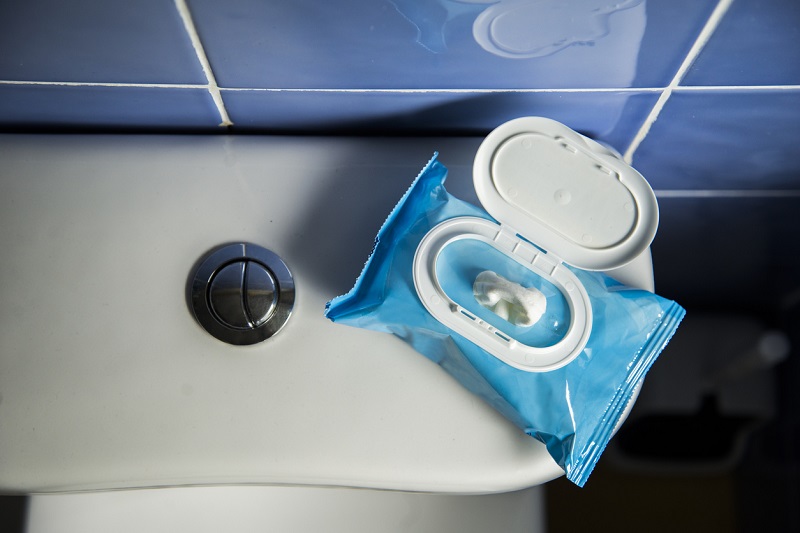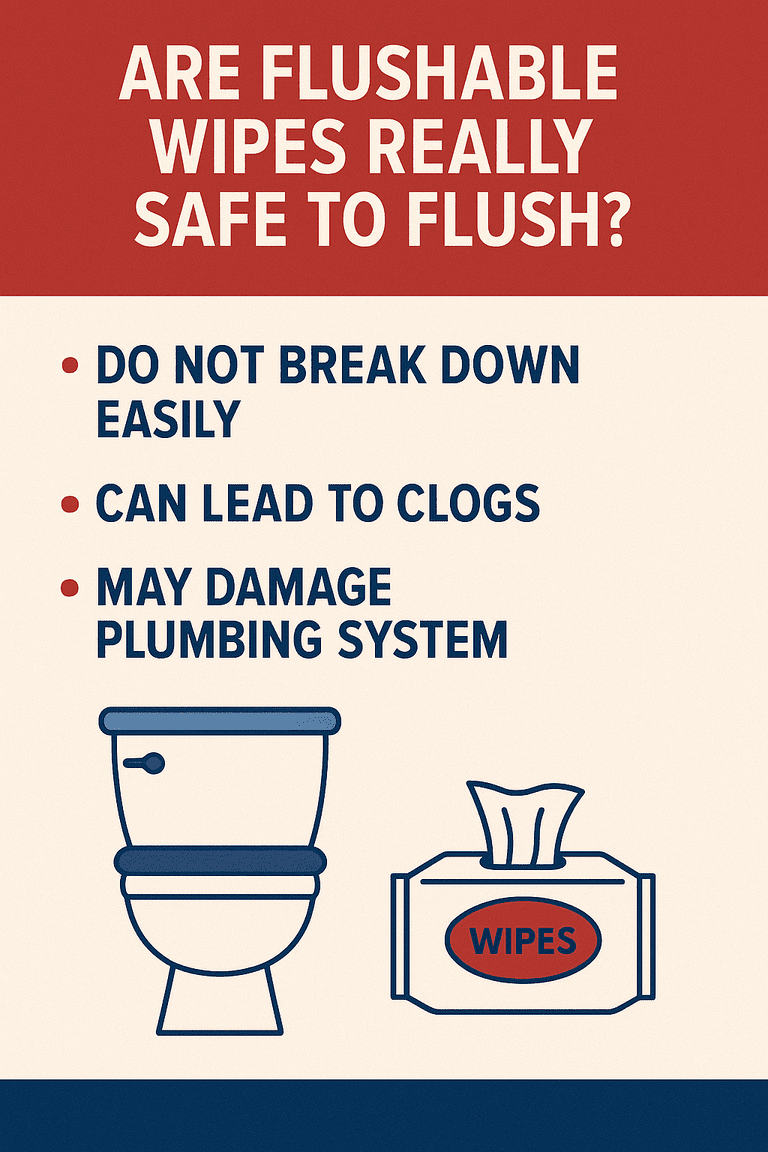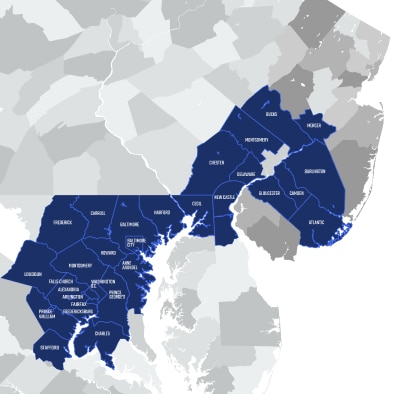Are Flushable Wipes Really Safe To Flush?

MICHAEL VETTAS
Trainer, The Master Trades GroupMichael Vettas brings more than 30 years of experience in the plumbing, HVAC, and electrical trades, along with a deep passion for developing the next generation of skilled technicians.
Learn More
Do you remember the first time you used a wet wipe instead of toilet paper? At first, you weren’t sure how to feel about it, but after a few more trips to the bathroom, you were hooked! While they might do a great job with the cleanup, they aren’t exactly the hero we thought they were when we first bought them. The packaging of these wipes do say “flushable,” but are they really safe to flush?

The Truth About “Flushable” Wipes
Wet wipes are marketed as “flushable” and “septic-safe,” so there should be no problem with flushing them down the toilet, right? Wrong! Even though these wipes do eventually break down, they take a longer amount of time to do so compared to toilet paper. Unlike toilet paper, which is designed to dissolve quickly in water, wet wipes retain their strength and structure much longer. Since the breakdown of wet wipes isn’t as rapid, clogged pipes, toilet backups, and sewer line blockages occur more frequently. This can lead to extensive damage to your home’s plumbing system and even issues with municipal sewer lines. Over time, flushing wipes can cause buildup in your pipes, requiring professional drain cleaning, pipe repairs, or even sewer line replacement. Putting your home’s plumbing at risk for serious clogs translates to hefty plumbing bills for you. To protect your plumbing and avoid costly repairs, it’s always best to dispose of wet wipes in the trash, even those labeled as “flushable.”
Which “Flushable” Products Cause Blockages?
There are many things people flush that contribute to blockages. After these so-called “flushable” wipes are flushed, they can get caught up with other items that are currently in your sewer line. Thick toilet paper, paper towels, cotton swabs, dental floss, sanitary pads, and toilet cleaning pads are all commonly flushed items that contribute to clogs and backups. When combined, these materials can form stubborn blockages that restrict water flow and damage your plumbing system. Over time, this buildup can lead to slow drains, foul odors, and costly emergency repairs. Avoid flushing anything other than toilet paper to keep your pipes clear and your plumbing running smoothly.
The combination of these items with wet wipes will create a mess of a blockage known as “ragging.” When this happens to you, break out your cellphone and start your search to find a plumber.
So, Should I Flush Flushable Wipes?
No. You should not flush flushable wipes. Manufacturers provide test results stating that flushable wipes are deemed safe to flush — however, there is evidence that supports the flushing of these wipes can increase the risk of clogged sewer lines and require pumping of septic tanks more often. Even though wipes might feel like the greatest invention since sliced bread, you should opt out of using them. Toilet paper is meant to be the ONLY thing flushed — other than “the obvious.” Using wipes regularly can lead to hidden plumbing issues that develop slowly over time, eventually resulting in costly repairs, backups, or even full sewer line replacements.
What Do I Do if Wipes Have Already Clogged my Toilet?
Just because someone says something, doesn’t always make it true. That same principle applies to your beloved “flushable” bathroom wipes and their deceptive packaging. When your home is experiencing frequent clogs (whether you use wet wipes or not), there is an underlying problem that needs to be addressed. Len The Plumber is always ready for your call, whether the clog is big or small! To learn more or to schedule an appointment, give us a call at (800) 950-4619.
Flushable Wipes FAQ
Are flushable wipes really safe to flush?
No, despite being labeled as “flushable” or “septic-safe,” these wipes do not break down as quickly as toilet paper. They can clog pipes, damage sewer lines, and lead to costly plumbing repairs. It’s best to dispose of all wipes in the trash instead of flushing them.
What happens if you flush flushable wipes?
Flushing flushable wipes can lead to blockages in your home’s plumbing system or the municipal sewer line. These wipes often combine with other flushed materials, like paper towels or sanitary items, forming a dense clog that restricts water flow and may require professional removal.
What items should never be flushed down the toilet?
You should never flush items such as paper towels, cotton swabs, dental floss, sanitary pads, toilet cleaning pads, or wet wipes. These materials don’t break down easily and can cause significant blockages and damage to your plumbing or septic system.
What is “ragging” in plumbing?
“Ragging” refers to the messy, tangled mass of non-flushable materials—like wet wipes and hygiene products—that accumulate in pipes or sewer systems. These blockages can cause slow drains, backups, and extensive plumbing damage.
Can wet wipes damage a septic system?
Yes. Even wipes labeled as “septic-safe” can build up in your septic tank and lead to more frequent pumping or even system failure. These materials do not degrade quickly and can compromise the balance of your septic system.
What should I do if flushable wipes clog my toilet?
If you suspect a clog caused by wet wipes or other non-flushable items, call a professional plumber right away. Frequent clogs could indicate a larger issue within your sewer line that needs expert attention. Len The Plumber is available for same-day service.
Is thick toilet paper bad for plumbing?
Yes, ultra-thick or quilted toilet paper can take longer to break down, increasing the risk of blockages—especially when combined with other flushed materials. Use only modest amounts and avoid flushing anything other than toilet paper and human waste.
How can I tell if wipes are causing plumbing issues?
Signs include slow drains, frequent toilet clogs, sewage odors, or backups. If these symptoms occur, it’s likely that flushed wipes or other debris are obstructing your plumbing. A camera inspection or drain cleaning from a licensed plumber can confirm the issue.
Why do companies label wipes as “flushable” if they aren’t?
Many wipes pass manufacturer tests in controlled environments, but real-world plumbing systems vary greatly. Despite marketing claims, these products often fail to dissolve quickly enough to avoid causing damage in household and municipal plumbing.
What’s the safest way to dispose of wet wipes?
The safest and most responsible way to dispose of any wet wipe—including those marked as “flushable”—is to throw it in the trash. This protects your plumbing, prevents clogs, and avoids costly emergency plumbing services.
Updated on: January 26, 2026
From Len The Plumber Heating & Air
 Coupons
Coupons 


